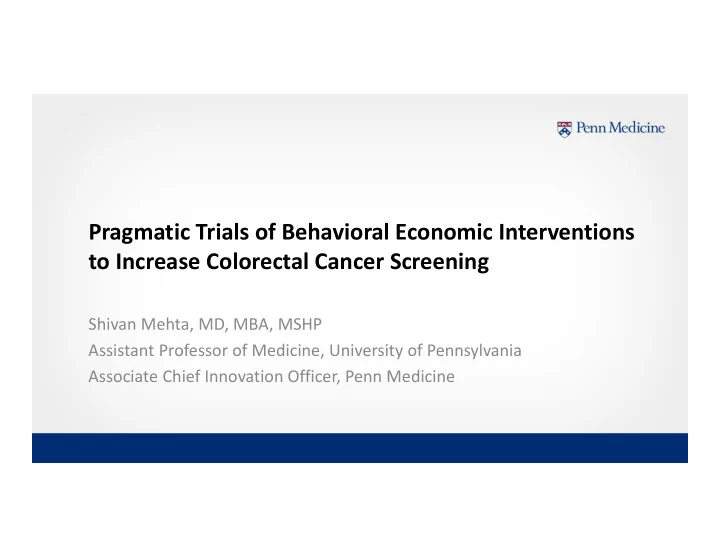

Pragmatic Trials of Behavioral Economic Interventions to Increase Colorectal Cancer Screening Shivan Mehta, MD, MBA, MSHP Assistant Professor of Medicine, University of Pennsylvania Associate Chief Innovation Officer, Penn Medicine
Agenda • Colorectal cancer (CRC) screening • Application of behavioral economics to CRC screening • Pragmatic trials of CRC screening interventions – Partnership with clinical operations – Waiver of informed consent – Leveraging existing clinical workflows and data sources
Limited CRC screening rates Screening can reduce mortality from CRC by 30 ‐ 70% “ Cancer Screening — United States, 2010 ” MMWR
Predictable biases Mehta SJ et al. Clinical Gastroenterology and Hepatology, May 2014
Behavioral economics
Clinical partners • • Academic health system Community health center in Philadelphia region in Philadelphia • • 43 primary care practices 3 health clinics • • 63% CRC screening rate 19% CRC screening rate
Consent for screening intervention trials 27% of eligible patients were unreachable or declined to participate Miller DP et al. Annals of Internal Medicine, 2018; Mehta SJ et al. Annals of Internal Medicine, 2018.
Waiver of Informed Consent 1. The research involves no more than minimal risk to subjects 2. The waiver or alteration will not adversely affect the rights and welfare of the subjects 3. The research could not practicably be carried out without the waiver Asch DA, Mehta SJ. NEJM, 2017
Opt ‐ in vs. Opt ‐ out Mailed FIT 314 eligible patients aged 50 ‐ 74 randomized Opt in Opt out Mail FIT kit if respond ‘yes’ Mail FIT if do not respond ‘no’ 3 month response Mehta SJ et al. American Journal of Gastroenterology, 2018
Opt ‐ in vs. Opt ‐ out Mailed FIT 314 eligible patients aged 50 ‐ 74 randomized Opt in Opt out Mail FIT kit if respond ‘yes’ Mail FIT if do not respond ‘no’ 3 month 10 % 29 % response Mehta SJ et al. American Journal of Gastroenterology, 2018
Text messaging and choice architecture Clinic Opt ‐ in Opt ‐ out Health Annex: You are You are overdue for Health Annex: You are colon cancer screening. due for colon cancer due for colon cancer screening. Please text To discuss your screening screening. We will mail back Yes to receive a you a free home test, options call us at 215 ‐ simple home test kit xxx ‐ xxxx. unless you reply ‘No’ CTER/ Patient ‐ Centered Outcomes Research Pilot
Text messaging and choice architecture Clinic Opt ‐ in Opt ‐ out Health Annex: You are You are overdue for Health Annex: You are colon cancer screening. due for colon cancer due for colon cancer screening. Please text To discuss your screening screening. We will mail back Yes to receive a you a free home test, options call us at 215 ‐ simple home test kit xxx ‐ xxxx. unless you reply ‘No’ 20% 3% 12% CTER/ Patient ‐ Centered Outcomes Research Pilot
Choice of Colonoscopy or FIT 438 eligible patients between ages of 50 ‐ 74 randomized Colonoscopy only Sequential choice Active choice direct phone number Colonoscopy only, Colonoscopy number to call and make then mailed FIT and mailed FIT appointment Mehta SJ et al. JAMA Network Open, 2019
Choice of Colonoscopy or FIT 4 month response Concurrent mailed FIT 29.1% at 3 months and 28.9% at 6 months 91% 52% 38% colonoscopy colonoscopy colonoscopy Mehta SJ et al. JAMA Network Open, 2019
Conclusion • Behavioral economics offers suggestions for how to increase CRC screening rates, but need to evaluate effectiveness in different contexts • Pragmatic trials can help evaluate effectiveness in naturalized settings through close partnership with clinical operations
Collaborators • Catherine Reitz, MPH • Abramson Cancer Center/ Breakthrough • Vikranth Induru, MD Bike Challenge • Tanya Khan, MD • National Cancer Institute (K08CA234326) • Timothy McAuliffe, BA • National Institute of Aging (Penn Roybal • Jordyn Feingold, BA Center, P30AG034546) • • Tess Niewood, BA Patient ‐ Centered Outcomes Research • Pilot/ Center for Therapeutic Sarah Huf, MD Effectiveness Research • Chyke Doubeni, MD, MPH • Kevin Volpp, MD, PhD • David Asch, MD, MBA
Recommend
More recommend